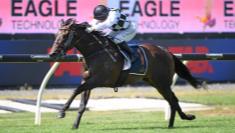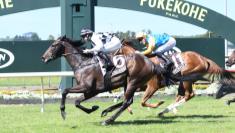.jpg)
A tale of two Steeplechasing mares
As the jumping season in New Zealand gets under way, in the other hemisphere it has wound down with Honeysuckle maintaining her position as jump racing’s pin-up girl.
If you follow National Hunt racing it is virtually impossible not to have heard about Honeysuckle. The winner of the Champion Hurdle at Cheltenham for the past two seasons, the mare extended her unbeaten career record to 16 straight taking out the Punchestown Festival’s Champion Hurdle last month.
Hardly surprisingly, Honeysuckle has quite the following, and the fact she is partnered in her races by Rachael Blackmore just adds to the media fizz around the super mare. The buzz around Honeysuckle led me to delve into New Zealand jumps racing history in search of our own talented jumping mares.
While you don’t have to go too far back to find the likes of Magic Wonder, a finalist in the jumper of the year category in the 2020-21 Horse of the Year awards, and Ima Heroine, the winner of that category for the 2011-12 season, mares jumping in New Zealand is a rarity rather than a regular thing.
There were two though, back in the mists of time, who earned their own followings as tough winners of the McGregor Grant Steeple – even better, they were a mother-daughter combination.
Aurlada won just one solitary race in a 30-start career, but it happened to be the McGregor Grant of 1981. The week prior she was in the spotlight for all the wrong reasons, finishing third in the Great Northern Steeplechase under the urgings of her 19-year-old jockey Chris Wood.
The ride was both meritorious and memorable. for the fact that at the fence at the 1600 metres Wood went to cut the corner.
“I went to cut the corner at the fence at the 1600 metres and Stephen Jenkins went too so I was inside of him. My foot hit the rail going into the fence and snapped the iron clean off. I got the other foot out of that iron and just kept going,” Wood recalled.
“I couldn’t see the point of pulling up, and it was the Northern,” he added, noting that others had queried him carrying on with no stirrups.
“It was sad to be beaten, but she was a tough tart and she finished on well. I occasionally watch the replay – “Aurlada coming with a wet sail” – it was a great call of Hauby’s!”
It was an interesting carnival for Wood, who had finished third behind Mark’s Gold in the Great Northern Hurdles on Bold Sam. In a race which was disrupted by fallers, Bold Sam’s saddle began to slip, and Wood had finished that race minus irons too.
Given his heroics in the Great Northern Steeplechase, one could have expected Wood to retain the ride on Aurlada in the McGregor Grant, but that honour went to Ray Johnson.
“I didn’t ride her because I was loyal and had already committed to ride Leroy and I wasn’t one of those jump off jockeys,” Wood said.
When she won the 1981 McGregor Grant Aurlada (by Aureate II) became the first mare to take the race out since her dam Falada.
Falada, a daughter of Golovine and the Foxbridge mare Mild Flutter, could generously be described as a slow starter, her four, five and six-year-old seasons did not yield any success. It wasn’t until her seven-year-old season that she began to put it all together, most notably finishing second in the Great Northern Steeplechase behind Royal Polo.
In the 1968-69 season, as an eight-year-old, Falada managed to put together a number of placings before running away with the Great Northern Steeplechase by four and a half lengths over Fleeting Moment, with Sifta Sam third and Eiffel Tower finishing fourth.
In winning the Northern Falada became the first mare to take out the gruelling ‘Chase since Our Nation in 1946.
Proving her toughness, Falada was back out on the Ellerslie track six days later laying claim to the 1969 McGregor Grant Steeplechase. Her season concluded with a second placing in an Amateur riders’ Steeplechase and a fourth in the Wellington Steeplechase, when it was still contested on the course proper.
Despite now being a nine-year-old Falada was back in the 1969-70 season but after an unplaced run in a Taranaki steeplechase and a third placing in the Pakuranga Hunt Steeplechase the curtain came down on the mare’s racing career.
While the deeds of Falada and her daughter Aurlada cannot be compared with what Honeysuckle is achieving the two mares demonstrate the benefits of patience and toughness when it comes to Steeplechasing.
Some things need to be seen to be believed! Watch Chris Wood ride with no irons here.









